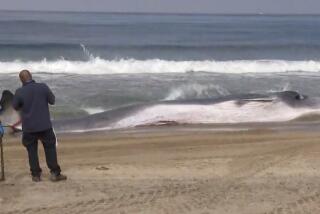We Need Sound Sensibility on California’s Coast
- Share via
On March 15, whales began stranding on the beaches of Abaco Island in the Bahamas. Local residents and a team of scientists in the area pushed a lucky few out to sea, but many of the whales did not survive.
Three months later, the U.S. Navy and the National Oceanic and Atmospheric Administration released the results of a three-month investigation, establishing with near certainty that the mass mortality was caused by the use of extremely loud “active” sonar by a Navy battle group traversing the adjacent New Providence Channel. Unlike previous whale strandings, where the absence of physical evidence has precluded a definitive connection to military operations, prompt analysis of the inner ears of six of the dead animals confirmed, for the first time, the dangerous role of active sonar to a level of certainty that even the Navy could not ignore.
The immediate importance of this “smoking gun” reaches beyond the victims of the Bahamas incident. On Dec. 12, the California Coastal Commission will consider a Navy application to deploy off the California coast a global low-frequency active sonar, or LFA, system intended for use over 80% of the world’s oceans, one of the loudest man-made sound sources ever deployed, operating at levels millions of times more intense than is considered safe for human divers and literally billions of times more intense than the level known to disturb large whales. According to the Navy, it would function much like a floodlight, using sound waves to scan the ocean for quiet enemy submarines at enormous geographic distance. Indeed, it is a system so powerful that a single sound source can flood with intense sound hundreds of thousands of square miles of ocean at one time.
The wisdom of the system--either strategically or environmentally--is disputed. Even assuming that a serious submarine threat still exists, some defense experts believe that, at the same time it “lights up” enemy subs, the LFA system would expose our own vessels to attack, thereby jeopardizing, rather than protecting, our troops. Unfortunately, because aspects of the system remain largely classified, there has been virtually no public discussion of the system’s strategic viability.
Its environmental impacts, on the other hand, have been hotly debated. While the Navy claims that the system can be operated safely, environmentalists cite a growing body of scientific evidence linking ocean “noise pollution” to environmental harm. Whales and other marine mammals are particularly vulnerable to noise pollution; they rely on hearing at least as much as we rely on our sight. In the ocean, a deaf whale is a dead whale.
Scientists fear that LFA, together with a growing number of industrial sources of noise, from supertankers to the giant air guns used in oil exploration, could interfere with essential biological functions--mating, feeding, navigating, nursing and communicating--of already depleted or endangered species whose survival depends on their ability to hear and be heard. What is at stake is not just the survival of individual animals, or even entire species, but the very integrity of our oceans, from our largest marine mammals to the smallest fish and even invertebrates.
Darlene Ketten of the Woods Hole Oceanographic Institution, who conducted the necropsies on the dead whales in the Bahamas, properly labeled the event a “red flag.” Before the Coastal Commission allows the Navy to deploy near California’s biologically rich coast the largest active sonar system ever devised, the commission and the general public need to understand far more about the Bahamas strandings and, more broadly, about the Navy’s entire active sonar program.
While we can’t afford to ignore our national defense, neither can we afford to accept blindly the Navy’s assurances that active sonar--and, in particular, LFA--is essential to our national security and harmless to our global ecosystem.
Especially given the strandings’ stunning confirmation of the risks, we cannot allow the Navy to play Russian roulette with our oceans.
More to Read
Sign up for Essential California
The most important California stories and recommendations in your inbox every morning.
You may occasionally receive promotional content from the Los Angeles Times.










